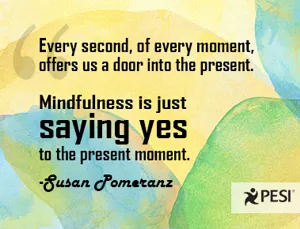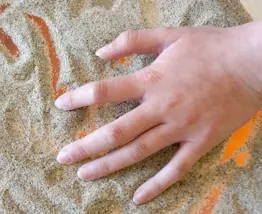Go ahead—put some love into yourself. (We dare you)

Most of us are so crazy busy helping others and living our lives that unless we’re getting up at 4 am for some kind of group meditation at a Zen retreat, our lives don’t lend themselves to the time it takes to deepen any kind of mindful practice. We can actually create even more stress and tension just trying to pull off some kind of balance for ourselves.
Now I’m not proud of this, but I’ve been known to pretty much drive folks off the road so I’m not late for my Yoga class. We’re all so busy running around to get it all done that it’s easy to forget the real deal: the peace and possibilities that comes from being in the moment.
We can do Yoga, or we can be Yoga.
We can practice Mindfulness, or we can just be mindful.
It doesn’t take much.
• Close your eyes.
• Take one minute. That’s it: 60 brief seconds.
• Take your hands, and lovingly stroke your face.
Don’t wait for someone else to do it, stroke your sweet face.
No one’s looking.
...Go ahead, put some love into yourself.
Take moments like these throughout the day.
In these simple moments, you’ll find all that you’ll ever need anywhere; the present, cut loose from the past, and unhindered by the future. And in each precious moment lies our freedom from fears, confusions, attachments and memories.
Every second, of every moment, offers us a door into the present which grants us such deep liberation.
Mindfulness is just saying yes to the present moment.
Susan Pomeranz, MFT, B.B.S.E., Certified Hypnotherapist, Certified Tai Chi Leader, Psychotherapist, has had over 20 years in private practice in Los Angeles. After a flourishing practice, Susan began experiencing the devastating and far reaching effects of burnout, and not having a framework for prevention nor treatment to draw from, spent five years researching and compiling evidence based practices that reduce stress and beneficially change the neurochemistry of the brain.
Now I’m not proud of this, but I’ve been known to pretty much drive folks off the road so I’m not late for my Yoga class. We’re all so busy running around to get it all done that it’s easy to forget the real deal: the peace and possibilities that comes from being in the moment.
We can do Yoga, or we can be Yoga.
We can practice Mindfulness, or we can just be mindful.
It doesn’t take much.
Try this:
• Close your eyes.
• Take one minute. That’s it: 60 brief seconds.
• Take your hands, and lovingly stroke your face.
Don’t wait for someone else to do it, stroke your sweet face.
No one’s looking.
...Go ahead, put some love into yourself.
Take moments like these throughout the day.
In these simple moments, you’ll find all that you’ll ever need anywhere; the present, cut loose from the past, and unhindered by the future. And in each precious moment lies our freedom from fears, confusions, attachments and memories.
Every second, of every moment, offers us a door into the present which grants us such deep liberation.
Mindfulness is just saying yes to the present moment.
Susan Pomeranz, MFT, B.B.S.E., Certified Hypnotherapist, Certified Tai Chi Leader, Psychotherapist, has had over 20 years in private practice in Los Angeles. After a flourishing practice, Susan began experiencing the devastating and far reaching effects of burnout, and not having a framework for prevention nor treatment to draw from, spent five years researching and compiling evidence based practices that reduce stress and beneficially change the neurochemistry of the brain.




